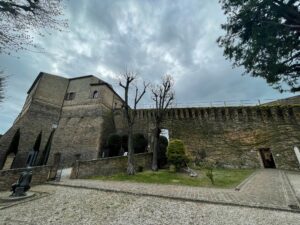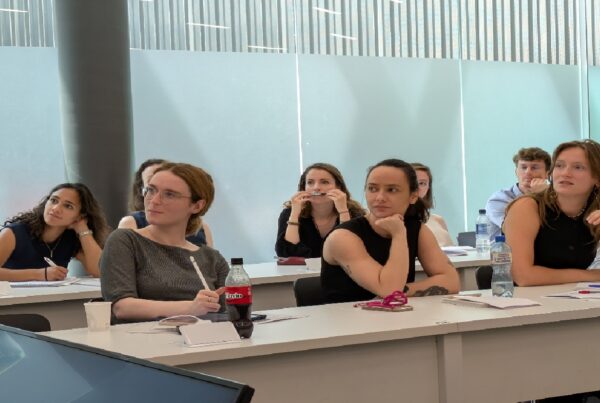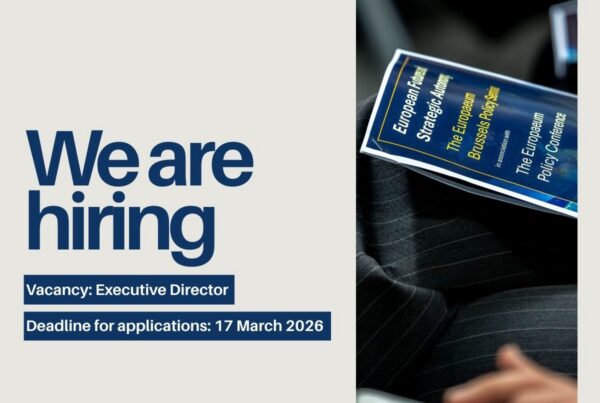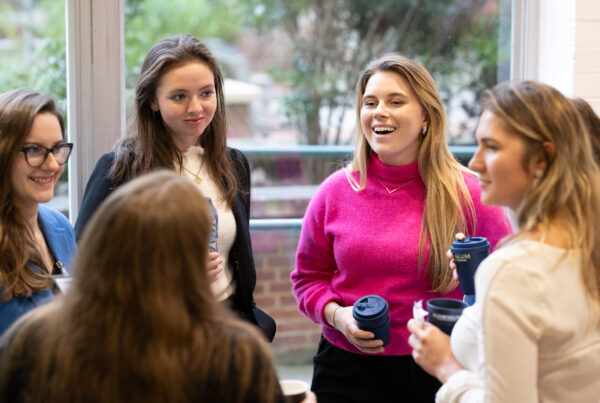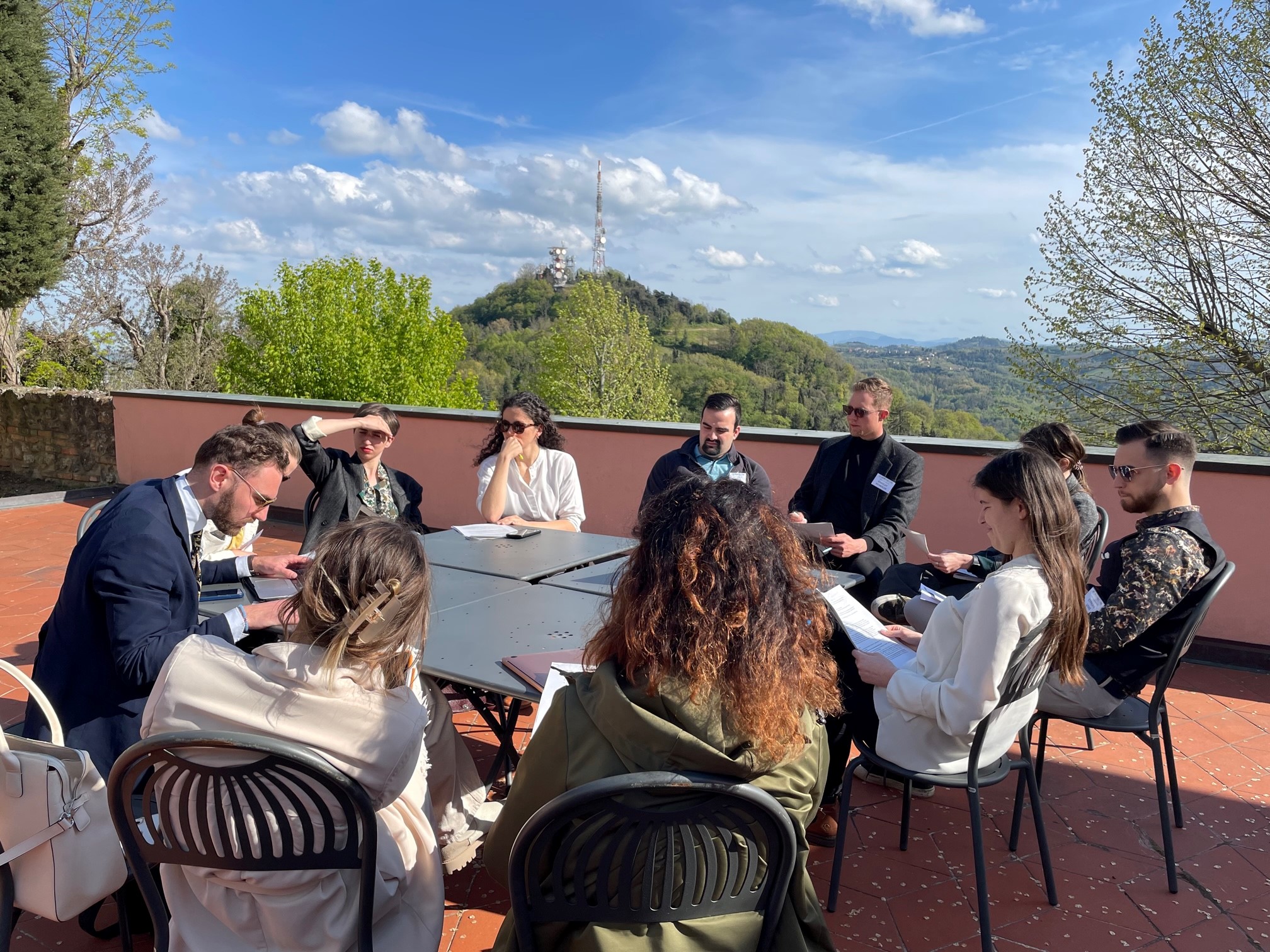
Scholars Programme: Cohort 3, Democracy in Europe (Module 5)
19-21 April 2023 | University of Bologna, Bertinoro, Italy
Amidst the Italian countryside, the Scholars enjoyed their fifth module at the University of Bologna’s idyllic conference centre in Bertinoro. This focussed on the state of democracy in Europe. Many of our discussions focussed on key challenges that democracy in Europe faces from both the far right and left wings of the political spectrum, such as rule of law, populism, political corruption, and disinformation, social media and elections.
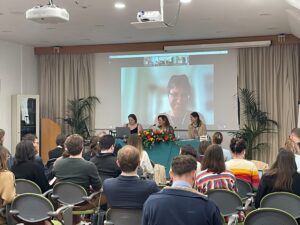
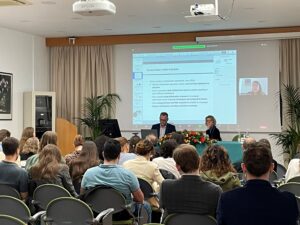
Prof. Gianfranco Baldini and Dr Enrico Padoan highlighted key features in current populist trends in the UK and Italy, and in Southern Europe respectively, and the impact of populism both on voter attitudes and the practice of politics. Over the last few years we have become increasingly aware of foreign actors trying to influence voters in Europe via social media, particularly through misinformation and disinformation. Following Heather Thompson’s (Democracy Reporting International) overview of key trends in the past few years, Ivana Karaksova provided a deep dive into China’s disinformation efforts in east-central Europe, and Serena Giusti put disinformation efforts into a broader foreign policy framework. Meanwhile Elena Esposito raised the issue of the algorithms and the different sorts of truth that we encounter and accept, and the implications of this for trust in political processes and its erosion. The theme of trust was also strong in the fascinating legalistic analysis by Profs Adam Bodnar and Rick Lawson and Prof Thomas Risse‘s distillation of challenges to liberal values. Further discussion examined the role of the courts in strengthening European democracies.
‘Il professore’ Romano Prodi delivered a keynote address that drew on his extensive experience in European politics to warn of the waning of European relevance in the world and the need for greater democratic resilience as a result. Peppered with intriguing recollections from his interactions with other world leaders the discussion ranged widely both chronologically and geographically. Another expansive discussion by Profs Helene Sjursen and Tanja Börzel focussed on the ways in which democracy and foreign policy are simultaneously intertwined but often subject to different expectations and procedures.
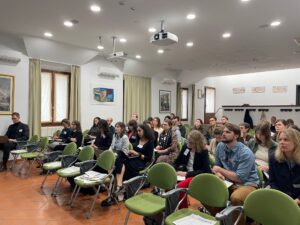
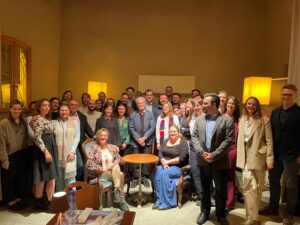
Several of the talks were concerned with more participatory models of democracy, a theme which is central to two of the Scholars’ group policy projects. A keynote by Prof Kalypso Nicolaïdis advocated for horizontal democracy with greater and more meaningful engagement by European citizens (and residents) and also highlighted several informative case studies of democratic models from around the world that can serve as inspiration for European approaches to democratic engagement and infrastructure. Vasiliki Mustakis (European Citizen Action Service) discussed the lessons learned from the European Citizens’ Initiative and Robert Bjarnason (Citizens’ Foundation) introduced us to the many digital democracy platforms with which he has been involved at local, municipal, and national levels and the factors that influenced their success.
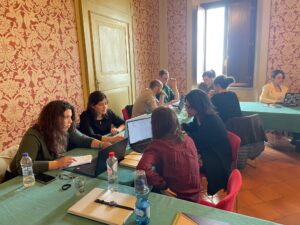
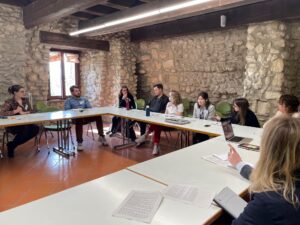
Inspired by these (and other) conversations, the Scholars brainstormed about how to tackle some of the current problems European democracies face. One exercise saw them think about the relation between politics, corruption, and ethics. Following an analysis of three recent cases of alleged political corruption, they produced recommendations of new guidelines and procedures for tackling the underlying causes of these cases. In another, they considered the worst-case scenarios for democracy in Europe and what legal and political infrastructure we need in order to prevent them from happening.
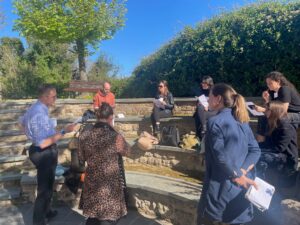
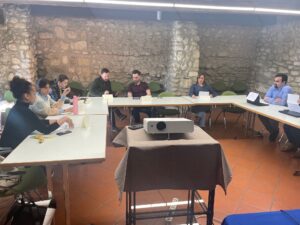
As part of the professional skills training that Scholars receive during their time on the Programme, they developed their negotiation skills with Prof. Wolfgang Sporrer, a veteran negotiator with a wealth of experience at the OSCE and in the private sector. After a discussion of key principles and tactics in negotiation, the Scholars went up against one another in a practical simulation, that allowed them to put some of the principles into action.
In every module, the Scholars work on their group policy projects. This involves intensive discussion, individual and group research, and sometimes also interviews or workshops with experts in the field. Amidst the Italian countryside, all of the groups made excellent progress towards their policy recommendations, which we look forward to seeing in September.
We’re grateful to Profs. Sonia Lucarelli and Matthew Loveless for their support and help in making the module happen and to all of the staff in Bertinoro for taking such good care of us during our stay.
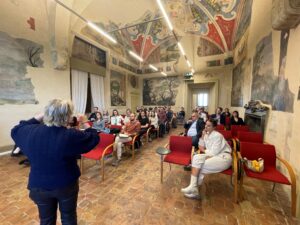
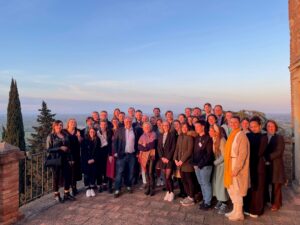
Scholars Perspectives:
Sophie Vériter (Leiden University, Leiden)
Jonathan Brosseau (University of Paris I: Panthéon-Sorbonne)
Cyprian Liske (Jagiellonian University, Krakow):
During the 5th intense module of The EUROPAEUM Scholars Programme held in idyllic Bertinoro, Italy, we engaged in discussions on democracy, populism and the rule of law, took part in negotiation training, and continued to work on our projects.
The keynote speech by Romano Prodi, former prime minister of Italy and former president of the EU Commission, sharing his rich experience with us, provided the frame for the whole module. I also enjoyed Kalypso Nicolaidis‘s talk pointing out the need for the EU to take more from the experiences of non-European democracies and presenting the innovative concept of demoicracy (as opposed to standard “democracy”). Given my legal background, I was particularly inspired by our discussions on the rule of law. Courts play a crucial role in preventing democratic backslide, becoming at the same time the first target for other political forces in times of crisis (just see what happened after the UK Supreme Court rendered its constitutional judgement on Brexit and devolution in the Miller case). However, looking at it from a different perspective, maybe we overlook that it is, in fact, easy to attack courts if they are ineffective and if people do not hold much trust in the system (which calls for a need to reform it – clearly this is the case of Poland).
It is not particularly useful to just say that “democracy is in crisis” or that “democracy is good”. I think we need to discuss the current state of affairs without too many assumptions, sometimes even evaluating the very fundaments of the political system, and with an openness to reforms; otherwise, larger groups of people may feel alienated and detached, with that only accelerating the backslide.
Wolfgang Sporrer, expert negotiator and former head of the Human Dimension Department of the OSCE SMM in Kyiv, engaged at that time in promoting dialogue between the opposing sides, provided us with invaluable insights into the negotiation process. We had an opportunity to hone our negotiation skills in practice on fictitious (but not distant from reality) cases.
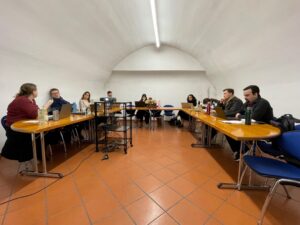
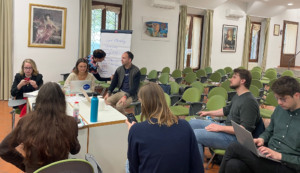
Savannah-Rivke Powell (University of Tartu):
From the Hills of Bertinoro: Reflections on the Fifth Module of the Europaeum Scholars Programme
March of 2023 was significant in that it marked one year since initiating the programme for the current cohort of Europaeum Scholars. The collective momentum of the week-long intensive training and work modules has continued to build in the most recent convergence this past April. The meeting took place in Italy just outside of Bologna in the quaint town of Bertinoro perched atop a picturesque slope. The town is surrounded by vineyards tucked along rolling hills and a seemingly endless horizon that fades into the misty waters of the Mediterranean Sea in the distance. With the increased demand of our project endeavours, it seems only fitting that we gathered to conduct work in such a peaceful landscape and in a structure once used as a monastery due to its idyllic environment for inducing a focused state of mind.
The project my team has developed aspires to engage youth with democratic processes, which was in perfect alignment with the theme for this module which was “Democracy in Europe”. As my research is based in the humanities, I find the subjects covered in the modules to be essential in broadening the scope of my knowledge base regarding historical and political pan-European subjects. Topics in this module covered everything from populism in Europe to digital democracy, disinformation, and the role of democracy in foreign policy. We had the honour to hear from such distinguished speakers as the former Prime Minister, Professor Romano Prodi. Listening to experts share their perspectives and theories on the political state of democracy is essential, but learning from someone who has worked directly with so many important figures impacting current events in Europe is invaluable. The session addressing digital democracy was of particular interest to my team as it outlined one possible approach to the issue that we have selected as our primary focus. There were clear examples of successful approaches and what we collectively recognized as areas requiring further improvements that we intend to address in our policy proposal.
The most impactful session in the programme for me came in the closing evening of the module with the lecture provided by Kalypso Nicolaïdis who is the Chair in Global Affairs at the School of Transnational Governance of the European University Institute. Nicolaïdis’s inspiring talk presented innovative ideas such as reversing the democratic gaze, which she suggested could be achieved by working towards diluting majority dominance. Following her inspiring lecture my team had the opportunity to reflect on these concepts further with her over dinner. Nicolaïdis emphasized the importance of citizen power in the European sphere, which is indeed an inspiring concept. I would propose a slight amendment to this phrase utilizing more inclusive language such as “folk power” considering that all peoples residing in Europe are invariably impacted by policy implementations despite their citizenship status or ability to access systems of democratic deliberation. Folk, as has been defined in my field of folklore so eloquently by Alan Dundes (1977), is an all-encompassing term that can be applied broadly to any grouping of people sharing some common identities and/or experiences. This holistic manner of relating to the people of Europe exemplifies the approach that is already being implemented among my team members as one of the numerous ways that we ensure diverse, equitable, and inclusive output for our project.
As the first doctoral student to represent the University of Tartu as one of the newer member universities in the network of the Europaeum Scholars Programme, I am humbled and deeply honoured to have these opportunities. I have immense gratitude to the Europaeum as an organization and those who work diligently to ensure such high-quality programming. Beyond the lectures and trainings by high-ranking policymakers, I am profoundly moved by the dedication of my colleagues in the programme who have inspired me to reach new heights. This programme has truly enriched our academic, professional, and overall life journeys in ways that will undoubtedly elevate us to achieve greatness, not for ourselves but for the overall betterment of Europe.
